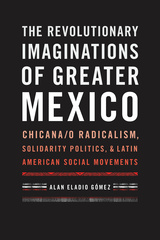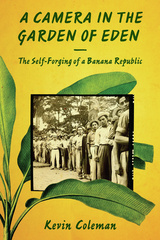Students of Revolution
Youth, Protest, and Coalition Building in Somoza-Era Nicaragua
Students played a critical role in the Sandinista struggle in Nicaragua, helping to topple the US-backed Somoza dictatorship in 1979—one of only two successful social revolutions in Cold War Latin America. Debunking misconceptions, Students of Revolution provides new evidence that groups of college and secondary-level students were instrumental in fostering a culture of insurrection—one in which societal groups, from elite housewives to rural laborers, came to see armed revolution as not only legitimate but necessary.
Drawing on student archives, state and university records, and oral histories, Claudia Rueda reveals the tactics by which young activists deployed their age, class, and gender to craft a heroic identity that justified their political participation and to help build cross-class movements that eventually paralyzed the country. Despite living under a dictatorship that sharply curtailed expression, these students gained status as future national leaders, helping to sanctify their right to protest and generating widespread outrage while they endured the regime’s repression. Students of Revolution thus highlights the aggressive young dissenters who became the vanguard of the opposition.
As a detailed and insightful analysis of student politics during the Somoza period, Rueda’s book provides an invaluable resource for scholars attempting to puzzle through the sometimes slippery political character of student politics in Nicaragua. It is a timely and informative work that makes a significant contribution to our understanding of twentieth century political history in Nicaragua and the hemisphere.
[Students of Revolution] is well-written and has a compelling storyline...Rueda’s book stands out among the very few studies on the Nicaraguan student movement and serves as an example of what this type of historiography on Central America should aspire to.
Joining a growing body of scholarship on student politics in Latin America during the Cold War, Rueda’s book illustrates the profound impact of student activism in a small country which did not see major uprisings in 1968.
Building on the rich historiography on resistance to the Somoza dictatorship in twentieth-century Nicaragua, Students of Revolution is the first book to center the catalyzing role that university students played across four decades of protest and reform. Beyond the political history of mobilization, it excels in offering sensitive insight into the ways students acted as organizers and educators in their communities, though literacy, song, theater, and protest. In the process, Rueda convincingly demonstrates how networks of students and community leaders steadily built a cross-section of support over decades...Authoritatively researched and clearly written...Rueda is particularly effective in bringing forward the underrepresented contributions of women and families to anti-authoritarian resistance.
[A] comprehensive book on how Nicaraguan students during the Somoza dictatorships...fought for political legitimacy and then used that authority to shape the society around them…Of extraordinary value are the unusual sources to which professor Rueda had access: oral histories through interviews with young students, advisers, parents, and university administrators; records in university archives; and flyers, publications, and student newspapers and correspondence.
Students of Revolution is an excellent book which takes on the difficult task of tracking student activism over time...Rueda keeps her focus on students while also providing the national context of the Somoza era years. The book will be of interest to a broad range of historians of Latin America’s Cold War.
Students of Revolution provides innovative research on the role of student movements in the history of revolution in Latin America during the twentieth century...Rueda’s window into the fascinating history of Cold War politics and youth culture in Latin America is of special relevance for those interested in the history of social movements and politics in institutions of higher education.
As a detailed and insightful analysis of student politics during the Somoza period, Rueda’s book provides an invaluable resource for scholars attempting to puzzle through the sometimes slippery political character of student politics in Nicaragua. It is a timely and informative work that makes a significant contribution to our understanding of twentieth century political history in Nicaragua and the hemisphere.
A lively history of the student movement in Nicaragua...[Students of Revolution] makes a useful contribution on the role of students in broad social struggles. Rueda shows that students, working with revolutionary organisations, campesinos, workers and unions, the Christian movement, small businesses, and other sectors, have been a driving force for social change.
A detailed and nuanced history of student politics...Students of Revolution is a much needed and refreshing addition to the historical scholarship on twentieth-century Nicaragua.
The great merit of Claudia Rueda’s Students of Revolution is that it offers a careful and nuanced historical account of student movements from the late 1930s up until the revolution, revealing in convincing and intriguing detail their continuity and accumulated strength...Students of Revolution makes a major contribution to our understanding of the Sandinista Revolution, certainly one of the most important events of twentieth-century Latin American history.
Students of Revolution is a beautifully textured study of university students who challenged one of the hemisphere's fiercest dictatorships, that of the Somoza dynasty in Nicaragua. Rueda's book will be enormously appealing to readers interested in twentieth-century resistance to state terror. The author writes with grace, and her impeccable scholarship is sure to stand the test of time.
Students of Revolution is an especially well-researched and thoughtfully crafted study of university students that fills a persistent gap in our understanding of the history of Nicaragua. Invoking the concept of a genealogy of dissent, Rueda contends that cross-class alliances, dialogue, and organization were ultimately responsible for the 1979 Sandinista victory. This nuanced argument changes the way we see Nicaragua’s revolutionary governments of the past, and it also challenges us to consider the transformative role of students in civil society. Rueda’s extensive oral histories and thoughtful work with memoir are remarkable. This book deserves a wide audience.
- Acknowledgments
- List of Acronyms
- Introduction
- Chapter 1. The Origins of Student Anti-Somoza Consciousness, 1937–1944
- Chapter 2. Protest and Repression during the “Democratic Effervescence,” 1944–1948
- Chapter 3. Defending Student Dignity, 1950–1956
- Chapter 4. “La Pequeña Gran República,” 1956–1959
- Chapter 5. Reform vs. Revolution, 1960–1968
- Chapter 6. Radicalizing Youth, 1966–1972
- Chapter 7. Un Trabajo de Hormiga, 1970–1979
- Conclusion
- Notes
- Bibliography
- Index












